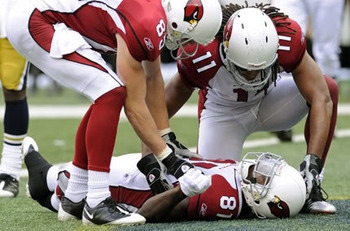The use of supplements also likely has been a factor in the increasing size and strength of players. The NFL has rigid procedures to test for banned substances, but players have been known to push the limits.
The NFL has tried to stay one step ahead with significant improvements in equipment, especially with helmets. But even that move may have unintended negative consequences.
Doctors are empowered to keep a player out of the game if they suspect he has a concussion. The NFL also mandates a number of medical precautions be in place for games, including standby emergency room physicians on the field. It is also standard procedure to keep a player immobilized when trainers suspect a spinal or head injury.
Tim Gay, an instructor at the University of Nebraska and author of the book "Football and Physics," said a hit like the one on McGahee can carry up to 1,500 pounds of force.
Boston University researchers said this week they have identified a link between repeated head trauma and dementia. The researchers said there were abnormalities in the brain tissue of former Buc Tom McHale, who died last year from an accidental drug overdose at age 45.
McHale was the sixth former player 50 or younger to have died while suffering a condition called chronic traumatic encephalopathy (CTE). The condition has one known cause: repeated head trauma, the kind of contact that is a normal part of line play in the NFL.
"It was different 10 years ago, when guys weren't getting carted off the field the way they are now. We've gotten so much stronger and faster now that those prize hits can be fatal hits. As players, we know we have to get bigger and stronger. But at the end of the day, everybody wants to be able to walk home."



